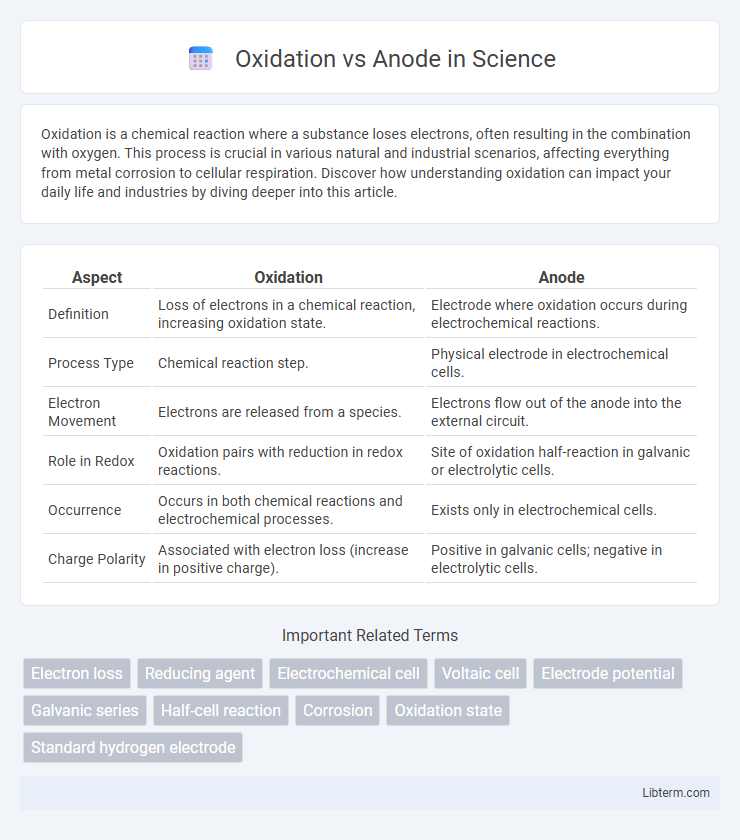Oxidation is a chemical reaction where a substance loses electrons, often resulting in the combination with oxygen. This process is crucial in various natural and industrial scenarios, affecting everything from metal corrosion to cellular respiration. Discover how understanding oxidation can impact your daily life and industries by diving deeper into this article.
Table of Comparison
| Aspect | Oxidation | Anode |
|---|---|---|
| Definition | Loss of electrons in a chemical reaction, increasing oxidation state. | Electrode where oxidation occurs during electrochemical reactions. |
| Process Type | Chemical reaction step. | Physical electrode in electrochemical cells. |
| Electron Movement | Electrons are released from a species. | Electrons flow out of the anode into the external circuit. |
| Role in Redox | Oxidation pairs with reduction in redox reactions. | Site of oxidation half-reaction in galvanic or electrolytic cells. |
| Occurrence | Occurs in both chemical reactions and electrochemical processes. | Exists only in electrochemical cells. |
| Charge Polarity | Associated with electron loss (increase in positive charge). | Positive in galvanic cells; negative in electrolytic cells. |
Understanding Oxidation: A Fundamental Overview
Oxidation is a chemical process involving the loss of electrons from a substance, typically occurring at the anode during electrochemical reactions. The anode serves as the electrode where oxidation takes place, facilitating electron transfer and enabling various industrial and biological processes. Understanding oxidation at the anode is essential for advancements in batteries, corrosion science, and electroplating technologies.
What Is an Anode? Definition and Role
An anode is the electrode in an electrochemical cell where oxidation occurs, meaning it loses electrons during the chemical reaction. It functions as the source of electrons flowing out of the cell, driving the redox process by facilitating the electron transfer. Understanding the anode's role is crucial for applications in batteries, corrosion prevention, and electroplating.
Oxidation Processes: Key Chemical Reactions
Oxidation processes involve the loss of electrons during chemical reactions, often occurring at the anode in electrochemical cells where substances such as metals or ions are transformed by electron transfer. Key reactions include the oxidation of zinc to Zn2+ ions or the conversion of chloride ions to chlorine gas, showcasing fundamental electron exchange that drives batteries and corrosion. Understanding these mechanisms is crucial for optimizing electrochemical applications like energy storage and metal refining.
Anode Function in Electrochemical Cells
The anode in electrochemical cells serves as the site of oxidation, where electrons are released from the reacting species and flow through the external circuit. This oxidation reaction at the anode is essential for maintaining the flow of electric current and enabling the reduction process at the cathode. Understanding the anode's function is crucial for optimizing battery performance, corrosion prevention, and various electrochemical applications.
Oxidation vs Anode: Clarifying the Terminology
Oxidation occurs at the anode, where electrons are lost during an electrochemical reaction, making the anode the site of electron release. In electrochemical cells, the anode undergoes oxidation as it donates electrons to the external circuit, distinguishing it from the cathode where reduction takes place. Clarifying the terminology helps in understanding that oxidation is the chemical process while the anode is the electrode where this process occurs.
Oxidation at the Anode: How They Relate
Oxidation occurs at the anode during electrochemical reactions, where electrons are lost from a substance, leading to the formation of positive ions. The anode serves as the site of oxidation in both electrolytic and galvanic cells, facilitating electron flow through the external circuit. Understanding this relationship is crucial for controlling redox reactions in batteries, corrosion processes, and electroplating applications.
Real-World Examples: Oxidation and Anode in Practice
Oxidation occurs at the anode in electrochemical cells, where metal atoms lose electrons and form positive ions, such as in a zinc-carbon battery powering household devices. In corrosion processes, the anode is the site where iron oxidizes to form rust, demonstrating oxidation's impact on metal degradation in real-world infrastructure. Industrial electroplating reverses this reaction, using the anode to dissolve metal into ions that deposit onto a cathode, showcasing controlled oxidation for surface coating applications.
Applications in Industry: From Batteries to Corrosion
Oxidation at the anode plays a crucial role in industrial applications such as battery technology, where it drives electrochemical reactions for energy storage and conversion. In corrosion prevention, controlling anode behavior through cathodic protection systems helps extend the lifespan of metal infrastructures by minimizing oxidative degradation. These processes are vital in sectors ranging from automotive manufacturing to marine engineering, ensuring both efficiency and durability of materials.
Common Misconceptions: Oxidation vs Anode
Oxidation is the chemical process where a substance loses electrons, while an anode is the electrode at which oxidation occurs in an electrochemical cell. A common misconception is that oxidation always happens at the anode regardless of the cell type; in galvanic cells, the anode is negative, but in electrolytic cells, it is positive. Understanding that oxidation is a reaction, not a physical electrode, clarifies that the anode's charge depends on the system's operation and does not define oxidation itself.
Summary Table: Oxidation vs Anode Differences
Oxidation is a chemical process where a substance loses electrons, typically occurring at the anode in electrochemical cells. The anode serves as the electrode where oxidation reactions take place, releasing electrons into the external circuit. In summary tables comparing oxidation and anode, oxidation describes the electron loss process, whereas the anode identifies the physical site facilitating this reaction in devices like batteries and electrolyzers.
Oxidation Infographic

 libterm.com
libterm.com